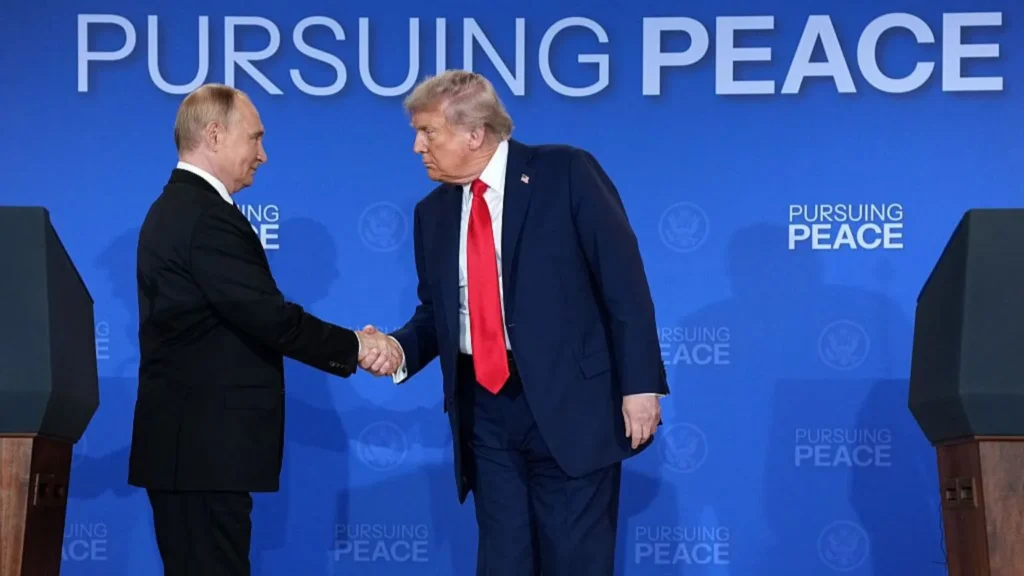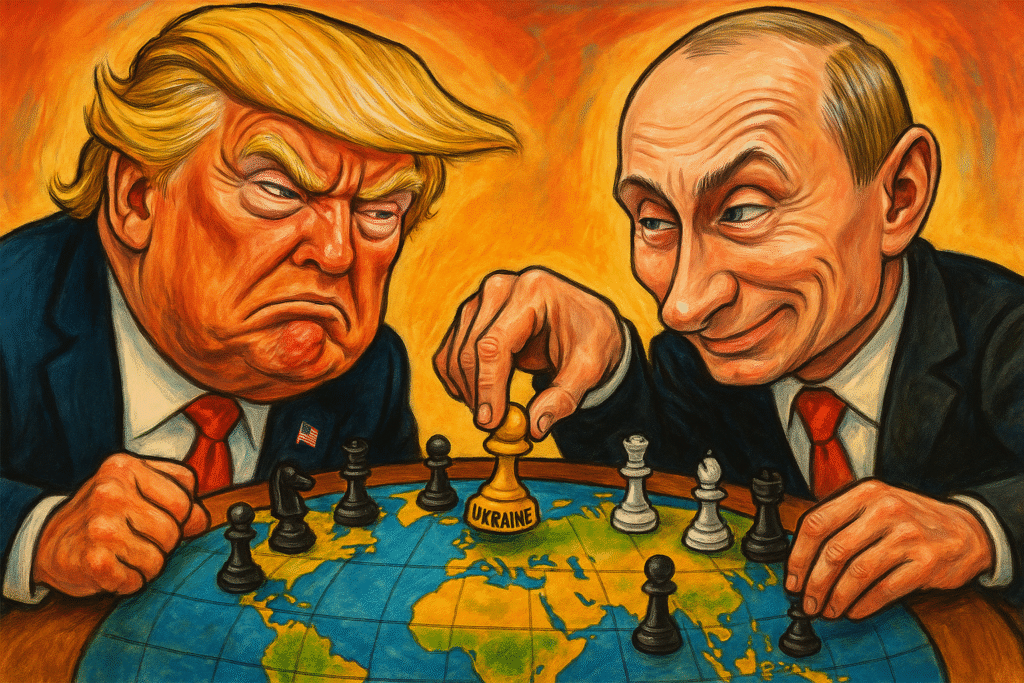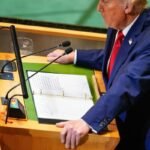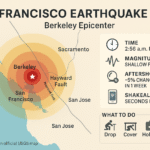
In the frigid wilderness of Alaska, where America once purchased land from Russia for a mere $7.2 million, President Donald Trump rolled out the red carpet for Vladimir Putin—literally. What unfolded at Joint Base Elmendorf-Richardson on August 15, 2025, was not the peace breakthrough Trump desperately needed, but rather a masterclass in how not to conduct diplomacy with authoritarian leaders.
When Theatrics Replace Substance: The Alaska Spectacle
The optics were undeniably spectacular. F-22 fighters screamed overhead, B-2 stealth bombers painted the sky, and a crimson carpet stretched across the Alaskan tarmac. Trump greeted Putin with applause and warm handshakes, even inviting the Russian leader into “The Beast”—the presidential limousine—for what appeared to be a cozy chat between old friends.
Yet beneath this carefully choreographed theater lay a troubling reality: Trump had just handed Putin his greatest diplomatic victory in years without receiving anything meaningful in return.

Putin’s Strategic Masterstroke: From Pariah to Partner
Vladimir Putin arrived in Alaska as a man facing International Criminal Court war crimes charges, isolated by most of the Western world since his 2022 invasion of Ukraine. He departed three hours later having achieved something far more valuable than any written agreement—international legitimacy on American soil.
“Putin clearly won,” declared former U.S. National Security Adviser John Bolton, who bluntly assessed that while “Trump didn’t lose,” the Russian leader “has gone a long way to reestablishing the relationship”. Putin had successfully transformed from Western outcast to welcomed guest, complete with the kind of pageantry typically reserved for America’s closest allies.
The Art of the Non-Deal: Trump’s Empty-Handed Return
Despite Trump’s claims of “extremely productive” talks and “significant progress,” the summit produced exactly zero concrete outcomes. No ceasefire. No peace framework. No meaningful concessions from Russia. Just vague promises of future meetings and Putin’s sardonic invitation: “Next time in Moscow”.
Trump’s own pre-summit metrics made his failure impossible to disguise. He had warned Putin of “very severe consequences” if no progress was made, and had previously boasted there was only a “25% chance of failure”. By his own standards, the Alaska summit was an unmitigated disaster.
The Nobel Prize Obsession: When Personal Ambitions Derail Policy
Perhaps no factor loomed larger over the Alaska summit than Trump’s well-documented obsession with winning the Nobel Peace Prize. His administration had been actively promoting his candidacy, with Press Secretary Karoline Leavitt claiming Trump had “brokered on average about one peace deal or ceasefire per month”.
This personal ambition created a dangerous dynamic where Trump appeared more invested in the optics of peacemaking than the substance of security. Foreign policy experts warned that Putin would “exploit Trump’s ambitions for admiration (a la Nobel Peace Prize) in an effort to get what he wants”—a prediction that proved disturbingly accurate.
A Pattern of Diplomatic Delusion
The Alaska summit eerily mirrored Trump’s previous diplomatic failures, particularly his 2018 Singapore meeting with North Korea’s Kim Jong Un. In both cases, Trump was seduced by the unprecedented nature of the meetings, the historical backdrops, and the made-for-television moments that would supposedly cement his legacy as a dealmaker.
Like Putin in Alaska, Kim understood exactly what he was getting: international legitimacy, a pause in American pressure, and the optics of parity with the world’s most powerful leader. What did Trump receive? Empty promises that were broken almost immediately.
The Ukrainian Perspective: Relief Mixed with Concern
While Ukrainian officials expressed some relief that Trump hadn’t immediately capitulated to Putin’s territorial demands, they were hardly celebrating. Ukrainian parliamentary member Oleksiy Merezhko bluntly called the summit a “failure,” noting that Putin had “exploited Trump to demonstrate that he is not isolated”.
The exclusion of Ukrainian President Volodymyr Zelenskyy from the talks was particularly galling. As one Ukrainian official noted, Putin had “won the informational war” while offering nothing substantive in return.
The Real Winner: Putin’s Strategic Patience
While Trump left Alaska empty-handed, Putin secured something far more valuable—time. The summit’s failure to produce even a basic ceasefire gives Russian forces continued opportunity to advance their military campaign, particularly during the critical months before autumn weather makes operations more difficult.
Russian forces continued attacking Ukrainian positions even as Putin sat across from Trump, discussing ways to supposedly end the violence. This brazen display of bad faith would have ended most diplomatic engagements—but Trump seemed either unwilling or unable to call it out.
The Broader Implications for American Credibility
The Alaska summit’s failure reverberates far beyond the immediate Ukraine crisis. By offering Putin such a warm reception while receiving nothing in return, Trump has essentially rewarded aggression and undermined the post-World War II international order that has prevented major power conflicts for decades.
Senate Minority Leader Chuck Schumer captured the gravity of the situation: “Instead of aligning with Ukraine and our allies, Trump stood side by side with an autocrat who has instilled fear in the Ukrainian populace and around the world for years”.
Trump’s Credibility Crisis: The 25% Failure Becomes 100%
Trump’s insistence that there was only a “25% chance of failure” has become a devastating self-inflicted wound to his credibility as both a dealmaker and a leader. His inability to secure even the most basic ceasefire—despite Putin’s supposed interest in ending the “tragedy” of war—exposes the hollowness of his negotiating prowess.
The summit’s failure is particularly damaging given Trump’s repeated claims that the Ukraine war would never have happened under his presidency. Putin’s public validation of this narrative—”I’m quite sure that it would indeed be so”—reads more like manipulation than genuine agreement.
The Path Forward: Hard Choices for a Weakened President
Trump now faces a series of unpalatable options. He can either follow through on his threatened sanctions—risking further diplomatic humiliation if Putin remains unmoved—or continue down the path of appeasing Russian demands while pressuring Ukraine to surrender territory.
Neither option offers the easy victory Trump clearly expected when he scheduled the Alaska summit. His promise to make Ukraine “make a deal” places the burden of concessions on the victim of aggression rather than the aggressor—a deeply troubling inversion of moral clarity.
Lessons from a Diplomatic Debacle
The Alaska summit offers several sobering lessons about Trump’s approach to international relations:
Personal ambitions compromise national interests: Trump’s Nobel Prize obsession created vulnerabilities that experienced adversaries like Putin could easily exploit.
Spectacle cannot substitute for substance: All the red carpets and military flyovers in the world cannot mask the absence of genuine diplomatic progress.
Authoritarians understand leverage: Putin came to Alaska knowing exactly what he wanted and how to get it, while Trump appeared to wing it based on personal chemistry and showmanship.
The Verdict: A Historic Failure
By any objective measure, the Trump-Putin Alaska summit was a diplomatic disaster of historic proportions. It provided Putin with international legitimacy while advancing none of America’s strategic objectives. It weakened Ukraine’s position while strengthening Russia’s resolve. Most damaging of all, it revealed the extent to which personal vanity can compromise national security decision-making.
Trump’s departure from Alaska—earlier than scheduled and without the lunch that had been planned—spoke volumes about how thoroughly he had been outmaneuvered. In trying to stage-manage his way to a Nobel Prize, he instead handed Putin one of his greatest diplomatic victories since the invasion of Ukraine began.
The Alaska summit will be remembered not as a moment of breakthrough, but as a cautionary tale about what happens when theatrical ambitions replace strategic thinking in the world’s most dangerous conflicts. For Ukraine, for America’s allies, and for the principle that aggression should not be rewarded, it represents a profound setback that will reverberate for years to come.
The question now is whether Trump has learned from this failure—or whether he will continue to confuse the art of the deal with the reality of diplomacy on the world’s most dangerous stage.










